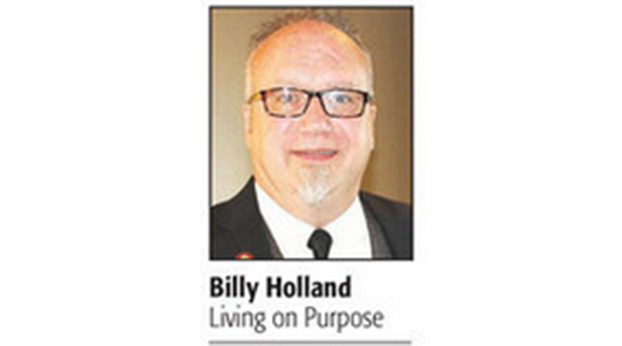Living on Purpose: Words can be forgiven but not forgotten
Published 3:12 pm Wednesday, August 31, 2022
|
Getting your Trinity Audio player ready...
|
By Bill Holland
Columnist
We will never rise above or surpass what we believe and speak. It’s a spiritual revelation to comprehend that words have power, and where there is a privilege, there is also responsibility. I realize that we have much to pray about, but this request is crucial if we are to live a holy life of integrity and respect. “Set a guard, O Lord, over my mouth; keep watch over the door of my lips” Psalm 141:3. Since what we say is what we think, it would be wise to monitor what we listen to and what we speak. Communication not only shapes our views while influencing our thoughts and behavior, but words also expose who we are, as we can learn a great deal about a person when we hear them talk. The word fire produces a variety of emotional responses when used in different environments. For example, pleading for fire when rubbing two sticks together is a positive response, especially when we are camping out in cold weather and hungry. However, screaming the word fire while in a crowded theater brings a negative reaction of fear and panic. As James chapter three points out, an evil tongue may be small, but it can destroy the world.
Words can accomplish God’s intentions and carry us to amazing places, but unfortunately, they can also lead us into situations we wish we had never known. As children, many of us quoted this little rhyme, “Sticks and stones may break our bones, but words will never hurt us,” which was a courageous stand as we were being threatened or made fun of. Still, we realized after we grew up that, in most cases, words were more emotionally painful than if we had been physically assaulted. There’s a good chance you remember when someone said something that caused you to feel rejection and pierced your soul. Maybe negative words from a parent, teacher, coach, a friend, a bully from school, or the neighborhood, and unfortunately, these painful wounds will always be remembered. Thankfully, some individuals change over the years as they recall the bad things they have said and are convicted to apologize and make things right as they realize that foolish people say foolish things.
On the other side of the two-edged sword of words, it’s astounding to understand they also have the power to bring inspiration, encouragement, and healing. In Proverbs 16:24, the Holy Spirit relayed to king Solomon that highly sensitive people are discreet and careful to use good judgment with their speech, while the uncaring do not plan or consider what they say. We know this is true because we have been comforted by God’s promises of hope and from those who deeply care about us. In the ancient world, honey was the sweetest substance available, and Solomon was intentional with his imagery as he penned these words, “Pleasant words are a honeycomb, sweet to the soul and healing to the bones.” We have the opportunity to filter our speech through the Holy Spirit, but it’s our choice to apply spiritual principles or ignore them. The person who is wise and desires to walk in the awareness of God’s presence will learn to have control over their carnal nature. Our emotions are only interested in pleasing our flesh, but God’s will is about His desires and how He wants us to live.
One command associated with obedience to God is to develop spiritual sensitivity and self-control, which are included in the fruits of the Spirit. As a result of choosing words wisely, our communication can become an important relay of God’s message. The Lord wants His people to reveal His character, and listening to individuals who follow His voice motivates us to embrace this beautiful way of connecting with others. Those who disregard spiritual discernment and do not care what they say are quite familiar with the flavor of their foot. “Do not let any unwholesome talk come out of your mouths, but only what is helpful for building others up according to their needs, that it may benefit those who listen” Ephesians 4:29. Let us consider that what is in the well will come up in the bucket. In this light, we realize that negative and destructive words are not the tongue’s fault, as it is only a servant to the mind and spirit.
This is an excerpt from Dr. Holland’s new book, “Receiving Our Healing” Learn more about the Christian life at billyhollandministries.com.


